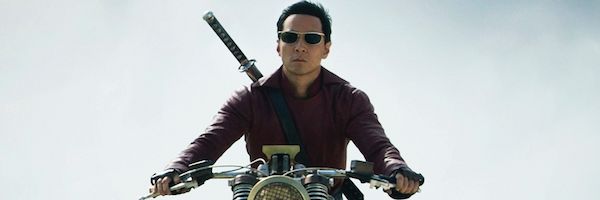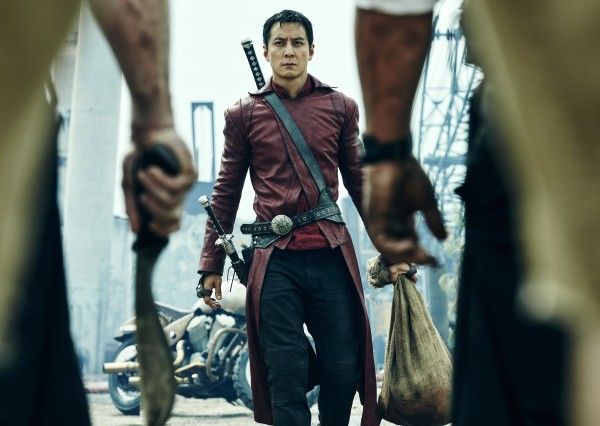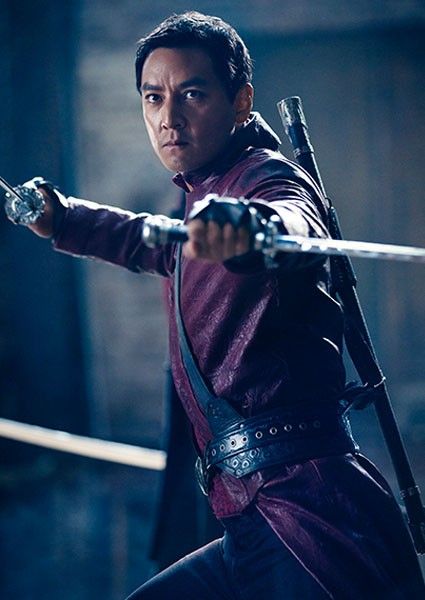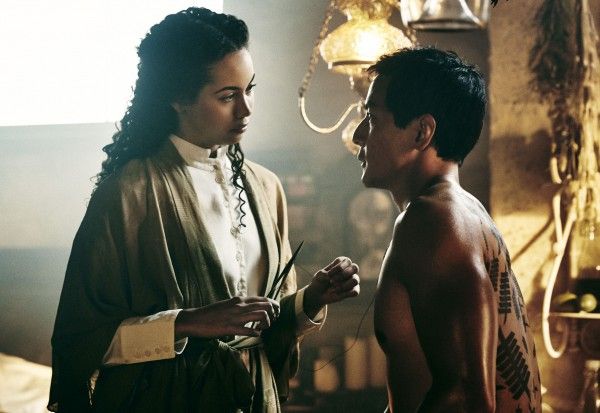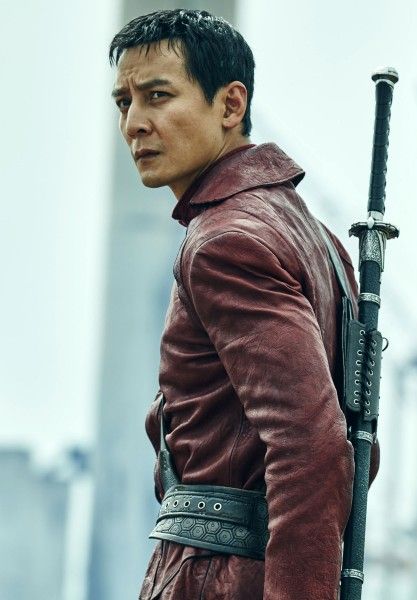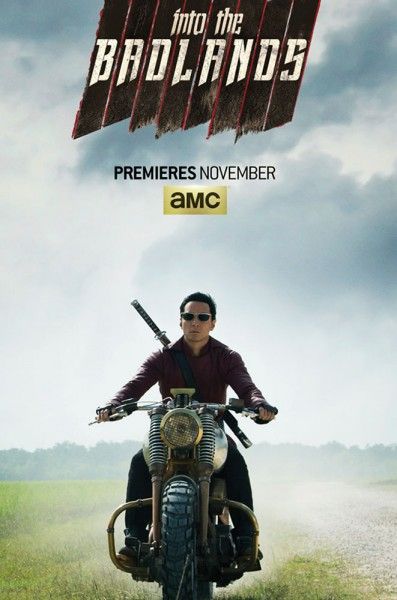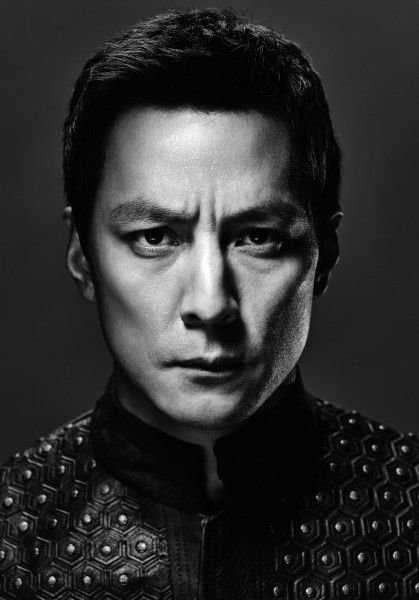The AMC series Into the Badlands is set centuries from now, when a feudal society has emerged in the wake of civilization’s destruction and this area, known as The Badlands, is uneasily divided among seven rival Barons, each enforcing their iron rule with the aid of loyal armies of trained assassins known as Clippers. The most lethal of the Clippers is Sunny (Daniel Wu), the most trusted advisor of Baron Quinn (Marton Csokas), who has been unchallenged as the Badlands’ most powerful Baron for decades. But when Sunny rescues a teenage boy named M.K. (Aramis Knight), they find themselves on an odyssey that could mean the difference between chaos and enlightenment for everyone in the Badlands.
During a recent conference call to promote Into the Badlands, Hong Kong-based Chinese-American actor, director and producer Daniel Wu talked about the challenges of acting in a lead role while also being an executive producer of the new hybrid show, why they couldn’t find anyone else to take on the role of Sunny, balancing fight scenes with emotionally-charged moments, the grueling physical training, seeing himself in his character, furthering the idea that the martial arts genre is more than just a stereotype, and what sets this show apart from other dystopian stories.
Question: What does it mean to you, as an Asian American, to be a lead and executive producer of a show on a major broadcast channel, in front of a very worldwide audience?
DANIEL WU: It’s interesting because I didn’t really think much about that until we were done making it. The process was very organic for me. To start off, I was just the executive producer developing a project for AMC, and that was exciting, in itself. And then, when we went through the audition process, it became clear that I was going to be playing the lead role. It didn’t start off that way. I originally thought we would get somebody in their late 20s or early 30s because, physically, it’s a very, very demanding role. But eventually, that didn’t work out. All eyes turned me and I ended up playing the role. So then, I just focused in on maintaining the stamina through the whole season, as well as portraying the character. I didn’t really think about the impact of what the show is, and being an Asian American male playing a lead role in the show, until much, much later. It was a great feeling to be able to do this show, knowing the history of Kung Fu, the TV series that Bruce Lee tried to get going, but then was stolen from him because studios were not ready to put someone Chinese in the lead. It felt really great to be able to right that wrong. And so, the impact of this started to seep in, but at the same time, I don’t think it will be groundbreaking until the show becomes a success. So, I don’t really feel like talking about it too much until the show becomes really successful. Then, we can say it was groundbreaking. Up until to that point, it’s not gotten there yet. But I really respect AMC for being adamant that the role was an Asian American role with an Asian American actor playing that role. If it wasn’t for that support, we wouldn’t have had that. The role is not necessarily designed for an Asian. It could be a white guy, it could be a black guy, it could be a Latino guy, or it could be anybody. But AMC was adamant at making sure that that role was reserved for an Asian male, so that’s pretty groundbreaking on their part. I don’t know if it was intentional or not, but I think the world of TV is changing now. You’re seeing a lot more Asians in TV media nowadays, so it’s cool to be part of that.
So, you stepped up to play Sunny because you couldn’t find anyone else?
WU: Here’s the thing is, there were a lot of requirements. They wanted the role to be Asian, they wanted the guy to have good acting ability and experience, and they wanted the guy to be a good martial artist. We either found a strong actor with no martial arts experience, or a really great martial artist without very good acting experience. That frustrated the other producers for a long time. And at the end of the day, they were like, “You are that package. You know that, right?” But I’m 40 and I didn’t know if I could handle the physical side for 5 or 6 years, if the show is successful.
Where is Sunny at, mentally, when the series begin?
WU: Mentally where he’s at when the series begins is that he’s a ruthless killer. He’s very smart and quick with his wit, and he’s efficient and very fiercely loyal to Quinn. But as the first episode starts, he runs into M.K. and finds about his girl being pregnant and things start to change for him. All his life, he’s been conditioned to follow this one cult leader and he’s created a life in killing people, and then once his world starts to change, he sees the purity of M.K. and his innocence, and he’s reminded of what he once was. That side of him starts to come back out. That’s what really attracted me to the character. I could see that this character is going to change over time, and that was what was interesting. He’s not just a stoic, cold-hearted killer, all the way through the series. For me, as an actor, I think that would be really boring. For him to have a real spiritual transformation was something that I thought I could get into.
Which is more challenging for you, as an actor, the elaborate fight scenes or the emotionally-charged scenes?
WU: It’s equally challenging on both sides. There were very stressful and challenging dramatic scenes, as an actor, but the fight scenes were also really physically demanding. To do eleven fights in four months is pretty crazy. In some shows that we do in Asia, there are three or four fights, over a six-month period, so you have time to recover and gain your stamina. But we were literally going back-to-back-to-back on all the fights. There was no downtime and no time to rest. And I knew that, as an executive producer, there was a possibility that I could get injured, and if I get injured, then it’s the end of the shoot. Luckily, that didn’t happen. I broke a rib on one stunt, but I was able to keep filming.
How did your diet change while you were enduring such grueling physical training for the show?
WU: That was crazy. I put on 18 pounds for the role because, normally, I’m pretty slim built and I wanted to put on a bit of muscle for the role. So, I did six meals a day prior to filming. And then, once we started filming, because of the heat in New Orleans, it was 90 degrees with 90% humidity, plus I was wearing a leather trench coat and fighting outside. I was just sweating, like cardio beyond what you can imagine. It was horrible because I didn’t enjoy that process. I love eating, but not to that level. Every two hours, I had to eat a full meal while doing a fight scene. I would pack it down and get back to the fight. It was grueling, tough and very difficult. It was a protein heavy diet with heavy carbs because I needed long-term energy to be able to keep the stamina up. It wasn’t a completely fat free diet. There was a meat and there was fat and energy storage for the endurance part it. I tried to make sure I maintain. A lot of people that do action films try to keep their body down to 7%, so they’re ripped and cut. I was trying to keep mine at 12 or 13%. I had fat to burn, and I had to maintain throughout the day, so I wouldn’t pass out.
How challenging is it to work with the rest of the cast, when not everybody has the same level of training and expertise?
WU: That was a very challenging thing. We were adamant that the actors be good actors first. We could have gone out to martial artists and gotten crappy acting, but I think that would really hurt the show. We wanted to get the right actor first, and if they knew martial arts, that was a bonus, or if they were a good athlete, that was a bonus. We knew that we would have to train them, so we had a six-week fight camp. All of our actors really had zero experience. Aramis [Knight] is really physically talented because he’s very athletic and young. Emily [Beecham] embraced it because she’s done some dancing, and it was the same thing with Ally [Ioannides]. But, we really had to start from zero with them. The key to making it all work was that, during the training period, we taught them all the basics of martial arts and tried to find what they were naturally good at, to exploit those things into the fight choreography, since you can’t become a master in six weeks. Aramis can do anything, and he’s game for anything, so we just got him to try a whole bunch of things. If he could do it, we would put it into the fight, and if he couldn’t do it, we didn’t try to put pressure on him or force him to do it. With Emily, we tried to use her grace to our advantage and incorporate that into the scenes. Although very deadly, her style is very smooth and graceful. And then, we made very smart use of doubles. We recruited a stunt team of five guys from China and four guys from the States who could do this level of fighting. It’s not every stuntman in the U.S. that can do it. It’s very difficult to be able to do 15 moves in a row, even if you are an accomplished stunt man, so we had to get martial artist stunt men that were experienced in working in this Hong Kong style. Whenever we had moves that were just too crazy for the actor to perform, they really relied on the stuntman to do it for them. The acting is the most important part because, if you have great action but crappy stories, it becomes B-level stuff, and we want to elevate it beyond that.
Is there a person or character that inspired or informed your performance as Sunny?
WU: It was all mostly from the script, but I think the script is influenced by a lot of stuff that we like. (Show creators) Al [Gough] and Miles [Millar] are very familiar with the martial arts genre. (Executive producer) Steve [Fung] and I are obviously been fans of the genre for many, many years. So, by osmosis of us being fans of the genre and understanding the tropes of this genre, that influenced our decision-making process. I wouldn’t say that we really took from anything, in particular, except for the reference of the journey to the West, which is a classic Chinese fable about character enlightening. The monkey king was given the responsibility to take the Buddhist scriptures from India to China, and it’s really the fable of how that came to China. The transformation of this character is the monkey king who starts off as a rebellious, naughty character, and then becomes an enlightened Buddha, at the end, because of all the fights and challenges. We took that concept and sub-text and put it into development of the character. You want to make sure there is stuff to keep people stuck on the show other than just the action.
Do you see any of yourself in Sunny?
WU: I always say that where I’m at now, in my life, is where I think Sunny is trying to get to. That’s what attracted me to the role. I’m at a stage in my life where, in the past couple of years, a lot has happened to me. I turned 40, got married, got a kid, and my mother passed away. I experienced life and death, with the enjoyment of creating life and the loss, within one year. And then, also, my career is starting to blossom. It has been for awhile, but I’m getting a name here in the United States. The state of mind of where I’m at right now is a very calm, peaceful state, which is different than the path before. I felt like I was fighting an uphill battle, or pushing up hill to become better. But now, I feel really comfortable with myself, in my own skin, and I think that’s where Sunny is trying to get to. He’s trying to find who he really is, and that’s what I have finally found at 40.
You've said in the past that you wanted to advocate for better roles for Asian actors in America. How has also being a producer affected that?
WU: Over the years, I’ve been auditioning for roles in the States, as well as have been offered roles in the States, and a lot of them did fall into that one stereotype, and I didn’t feel the need to actually do that. But, things have changed over time. There’s a huge interest in the Chinese market, and Hollywood has a huge interest in the Chinese market with films like Transformers making more money over there than here. They’re realizing that, by injecting Chinese actors into their films now, that gives an extra bonuses in that territory. But with that, they would also get to put them in the right role. I still feel like that that hasn’t been done properly yet. When I first started working on this, it was only as a producer and not as the main actor, mainly because I wanted to see where this role was going. I knew that putting an Asian in a martial arts genre show is very stereotypical, but I wanted to see what the character was like. I wanted to know whether it would be the type of Asian character that we’ve seen in Asian films before, with martial arts that was very stereotypical. But what we’re seeing is a strong Asian male lead who has a girl, who resists, and who’s not just part of the team, but who is leading this whole story. It’s something that we haven’t seen before. He’s stoic, but then he opens up and you see his emotional side. It wasn’t intentional. It just happened that way, but that’s how I fell in love with the character and why I decided to do it. It didn’t have all of the stereotypes that you normally see. It started with a stereotype and blossomed into something else, and that’s what really attracted me to this role. We weren’t consciously trying to change Hollywood by creating more diverse roles for Asians, but it just happened to be that way because the team I work with are people who are less close-minded than the executives in Hollywood.
How are you furthering the idea that the martial arts genre is more than just a stereotype?
WU: I’ve built a career in Asia for 18 years, playing roles that had nothing to do with my race because everybody’s Chinese in the films. So, when I’m doing a Kung Fu movie in Hong Kong, that’s made by Hong Kong people, is that still a stereotype? It’s hard to say. For Caucasian audiences, the first thing that they think of when they think of Asian people is maybe Kung Fu or nerd. But at the same time, this is a genre that Chinese people have been doing for almost 100 years now. So, to say that it’s a stereotype for American audiences, maybe, but for me, in my career, it’s not. I’ve been doing Kung Fu films for many years, throughout my career in Asia, and I don’t consider that a stereotype. It’s just a genre of film that we make there. What we’re trying to do here is to take the Wushu genre and reboot it for the Western audience. This world that we’ve created is a very typical Wusha world. We just want to take that genre that we’ve done very well in Asia, and put it into a different environment and flip it on its head.
How challenging is it to find a balance between bringing in all these new characters and telling the stories to keep people interested, but not confusing people with too many backstories, at the same time?
WU: That’s a difficult balance to try to achieve. I think our main goal is that we wanted to create a martial arts drama for television. It’s never been done before. But in order to be successful, you can’t just have great martial arts and a shitty story. It becomes like porn, if you do that. People will fast forward the story just to get to the fight scene, and then watch the fight scene and dump the show, and we didn’t want to have that. That’s very D-level filmmaking. What’s successful about The Walking Dead is that it took the zombie genre and elevated it. It’s a human drama about what humans will do to each other when you’re thrown into that kind of basic role of trying to survive. People are into that story because it’s about these people and not about the zombies. That’s the same thing we’re trying to do with Into the Badlands. We want to create this story about these people, and not just about the martial arts. The martial arts are a bonus. It’s something that the people that fans of that genre will totally gravitate to. But we want a much broader audience to make this show successful, and to do that, you have to have a compelling story and compelling characters. It’s a balance. You have to make it complex enough that people are intrigued, but you can’t make it so confusing that people don’t know what’s going on. We’re also trying to a create a world that is rich in characters and that is not just one solo warrior walking through the desert on his own. It’s a show that has many characters that many different audience members can get behind.
Why represent this kind of dystopia to an American audience?
WU: I’ve always been attracted to this world of the dystopian future just because I’ve always been a fan of sci-fi. It’s fun how those kinds of stories are actually more of a reflection on society now versus an idea of the future. And so, the opportunity to work on something like this, where we can make those kinds of social statements, is just interesting. We’re saying that there’s no gun that exists in this world. Coming from an era where gun violence is at its craziest peak, and it’s insane what’s happening with that, we’re allowed to witness a dystopian future and make real comments about society today, whether it’s conscious or subconscious. The dystopian future allows us to make comments about American society today. Race doesn’t matter in this world, when we are having a period in America where race is actually a very volatile subject. Even though we have an African American president in office, it seems like race relations have taken a step backwards. We’re creating a society that attempts to touch on those topics, here and there, but not in a very overt political way. It’s interesting for me, and actually makes working on it that much more interesting.
What makes this show distinct and sets it apart from other dystopian shows?
WU: Usually, it’s a world of chaos that’s a few hundred years in the future, where it looks like the past is really the future and the society has been reset and re-established. With most of the dystopian stuff you see, the world is still chaotic and still trying to figure out where they’re going to head to. This world and that end have already gotten to a place where it’s recreated and resettled itself into a society. And so, what you’re seeing is the basics of human nature and human culture that are still there, and what we don’t like about our society is not there anymore, like guns. But one thing that’s still there is the desire in human nature for power and for having control. That’s been part of culture as humans for thousands and thousands of years, since the beginning of time. We war and we battle, and that’s still there. What’s different is that the society is a mature dystopian society that’s had time to reset itself, and to choose what it wanted and what it didn’t want.
It seems like M.K. maybe has some kind of powers, or something going on. Does the show have that kind of fantasy element?
WU: He definitely has a dark secret that we’ll see evolve, throughout the first season. He does have a power. I’m not sure if it’s a sci-fi related power, but it’s more related to this Kung Fu genre. I don’t want to reveal any spoilers, but it’s something that will become a focus of Sunny and M.K.’s relationship, in terms of harnessing that power and learning how to use it correctly.
How are you juggling being a lead actor on the show, as well as an executive producer?
WU: It was very, very challenging. I can say our days are 12 to 16 hours long. I had a trailer that I got into in the morning to put my clothes on, and once I was on set, I never left set all day long. If I’m not shooting, I’m doing some kind of problem-solving, as a producer, for either something that’s happening right there on set, or something that we’re preparing for the next fight, or coordinating something with our production people. It’s very, very busy. There’s not much time to rest. If I’m not fighting, there are 10-minute breaks between lighting changes and I’m working on some other issue. It’s schizophrenic and it’s crazy, but I’m glad it happened to me, at this point in my life. If I was in my 20s or 30s, trying to play two roles like this, as the executive producer and the actor, that would probably make me crazy. But because I have a lot of experience producing and acting, I was able to find that balance. It was still mad, but we were able to do it.
Were you able to remain injury free for these episodes?
WU: Relatively. There was one incident, where I got hang up in the wire and I cracked a rib, but that was minor. I didn’t even know it was broken until three days later. I was like, “It still hurts. Maybe I should see the doctor.” And he said, “Yes, you got a cracked rib.” There’s not much you can do about that. I was mostly worried about muscle strain, torn ligaments, and things like that, because those are really hard to come back from. But that didn’t happen, so I was lucky.
For people wondering whether or not they should tune in to this show, how would you describe it?
WU: I would say that it’s a mash up of everything that we think is cool. The goal was to try to create a world that we haven’t seen before. What’s very prevalent in the Wushu genre is melodrama and over-acting, so we made it more like what we’re used to in the West, with that kind of serious dramatic acting, and we’re embracing the southern Louisiana world. It pulls from graphic novels, animation, Kung Fu movies, samurai movies, cowboy movies, and all of that stuff, putting it all together. It’s very confusing, at first, but we’re creating a unique world where, eventually, you won’t think about what it’s referencing. If you can accept that world, then you’ll be into it.
Into the Badlands airs on Sunday nights on AMC.

